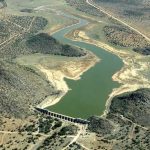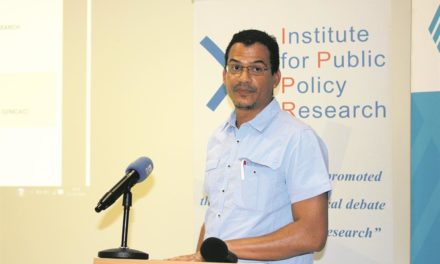
Namibia Shines at Africa Energies Summit 2024

The Managing Director of Monasa Advisory & Associates and Chairperson of the Economic Association of Namibia, Jason Kasuto, attended as a selected speaker at the Africa Energies Summit 2024.
The summit organised by Frontier Communications, now in its 10th year, is a cornerstone event that brings together leaders and innovators from across the continent to discuss the dynamic energy landscape of Africa.
The Africa Energies Summit, hosted annually, serves as a platform for stakeholders to explore opportunities, address challenges, and collaborate on solutions in Africa’s energy sector. This
year’s summit featured prominent speakers, panel discussions, and interactive sessions focusing on key topics shaping the future of energy in Africa.
One of the speakers included Kasuto, who took the stage in central London to share his expertise and insights on the crucial topic of local content policy and its implementation in Africa’s energy sector. His expertise and experience in energy policy and regulation added a valuable addition to the lineup of distinguished speakers at the summit which also featured a few Namibian Delegates, including Maggy Shino (Namibia Petroleum Commissioner), Shakwa Nyambe (SNC Inc.), Nelson Lucas (Head, Corporate and Investment Banking, Standard Bank Namibia).
Kasuto discussed the importance of using foresight tools like the Namibian SAM (Socio-Economic Assessment Model) to analyze the potential impact across various sectors.
“We must start with a thorough analysis of potential impact across various sectors by applying socio-
economic impact foresight tools such as the SAM that is built to assess impacts specific to the country context, e.g. N$1 spent on cement in Namibia has a different impact than N$1 spent on the same in West Africa, the SAM analysies the impact of each dollar spend across industries, its multiplier impact on employment, household income, and local GDP. This allows us to apply foresight and have a more accurate view of where the most value can be attained (even in indirect sectors beyond Oil & Gas) and where improvements in value attainment can be found,” he mentioned.
He further emphasized that there is a need for a firm-level analysis of SMEs and large enterprises to differentiate between a quality gap and a capability gap.
“Prioritizing goods and services for local development must consider both dimensions. The assumption is that intervention for a potential supplier with a high capability gap would be quite different from one with a high-quality gap. E.g. a high-quality gap firm would require for example training; while high capability firms would require access to procurement pathways and credit to expand facilities or invest in new equipment,” he continued. He also highlighted the importance of Blueprint and Strategy.
“What’s important is that beyond the policy and legislative alignments, Namibia requires a forward-looking, fit-for current and future purpose Oil & Gas In-Country Value Blueprint and Strategy.”
Furthermore, Kasuto advocated for creating an enabling environment, that allows for transparent information flows between all stakeholders, one way, is for the government to establish vendor registration platforms in collaboration with input from stakeholders, including International Oil Companies (IOCs).
“This creates a database of quality and quantity suppliers, by bridging especially the information gap. Since the key announcement of discoveries, Namibia has experienced that any event speaking to the sector is always fully subscribed. This shows you the keen interest from local firms but also a significant information flow gap,” he added.
He also discussed successful financing models like Brazil’s Progredir Programme. “This programme, in conjunction with Petrobras and major banks, offers credit with competitive conditions to the Petrobras supply chain, enhancing liquidity and financial strength. The receivables of contracts and performance information mitigate supplier credit risk, which is crucial for the financial health of local enterprises. With Namibia’s growing focus on energy development and sustainability, participation in events like the Africa Energies Summit is crucial for policymakers,
industry professionals, and stakeholders,” he highlighted.
In terms of local content, he emphasized that its requirements most often have the intention of generating broad-reaching impact from the investment foreign companies are making. They can aspire to improve local people’s lives, and involve them as much as possible in the new projects and developing industry.
“In the panel today we have the participation of two countries in different stages of maturity concerning the development of oil and gas. He concluded by promoting Pan-African collaboration wherever possible especially collaboration with jurisdictions who are more mature in the sector on the African continent.
“There is an evident infrastructure and services need, such as the onshore base facilities support and logistics services, which can be a major revenue, technology transfer, and capability generator for both
local content firms and government beyond the taxes and royalties regime,” he ended.
The summit provided a unique opportunity to learn from experts, exchange ideas, and identify opportunities for collaboration and investment in the energy sector. The summit attracted attendees from government, industry, academia, and civil society across the continent. Participants gained valuable insights into emerging trends, innovative technologies, and best practices driving energy transformation in Africa. Key figures, including top leadership of international oil companies, their service providers and government ministers, energy sector leaders, and innovators from across the continent were in attendance, and delegations from various countries and organizations committed to energy development in Africa.
Namibians are encouraged to take a keen interest in platforms like the Africa Energies Summit, as they provide invaluable opportunities for networking, learning, and collaboration. By actively participating in such conferences, Namibian stakeholders can stay abreast of industry trends, forge partnerships, and contribute to the sustainable development of the nation’s energy sector.














































